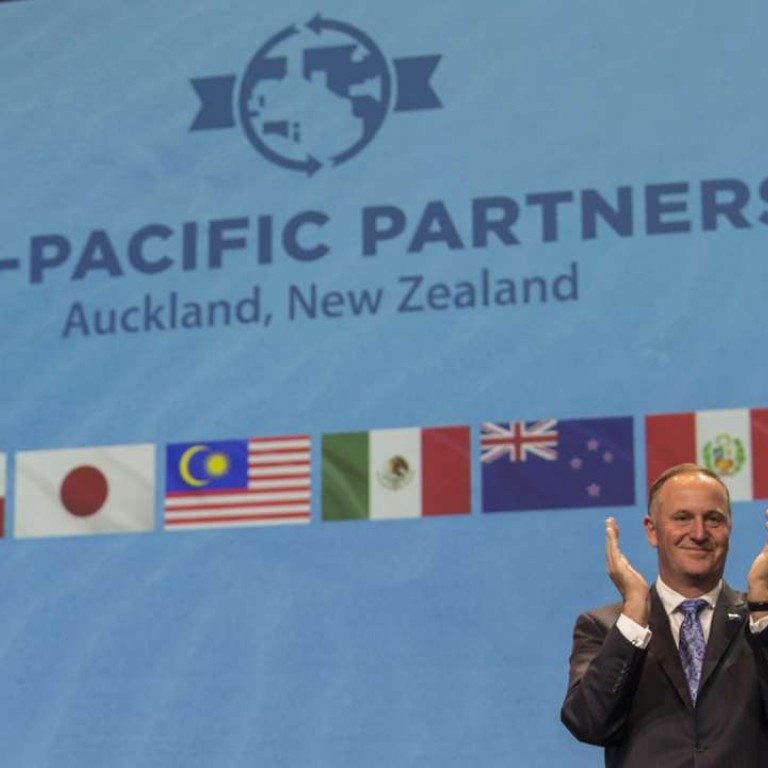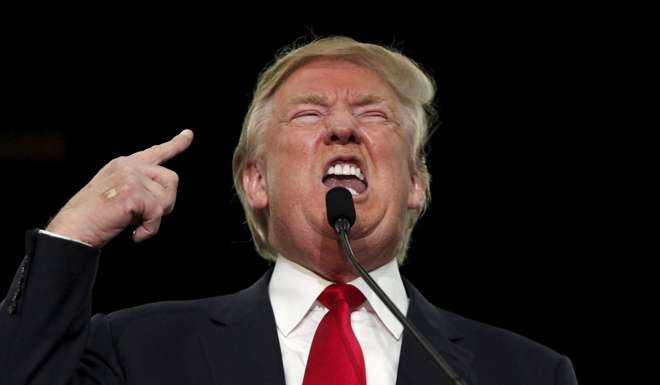
Is Trans-Pacific Partnership trade deal really as dead as Trump and Clinton say it is?
Analysts say there are plenty of examples of candidates changing their tune once they become US president
Hillary Clinton and Donald Trump squared off on a host of issues in their presidential debates but there was one – the fate of the Trans-Pacific Partnership (TPP) free-trade agreement signed by the US government early this year – on which they appeared to agree.
Both US presidential candidates have repeatedly claimed they oppose the landmark deal, which is aimed at promoting economic growth and slashing tariffs on trade among 12 Pacific Rim nations, with the notable exclusion of China.

Despite all the anti-TPP election rhetoric, many analysts still say the next US president is likely to adopt the pact, albeit under a different name and with possible alterations.
“I think being candidates and being presidents are two very different things. We’ve had a lot of examples in the past,” said Elizabeth Economy, director for Asia studies at the New York-based Council on Foreign Relations. “People who say they’re going to do one thing when they’re campaigning end up doing the exact opposite once they’re sitting in the White House.”
Scott Kennedy, deputy director of the Freeman chair in China studies and director of the Chinese business and political economy project at the Washington-based Centre for Strategic and International Studies, said that if she was elected, Clinton would seek renegotiation of the TPP, perhaps calling it something else, and change some of the United States’ starting positions on certain issues.

“Given that Hillary Clinton helped initiate the negotiations over the TPP and probably agrees with 95 per cent of what’s in TPP, she might prefer that TPP be adopted before she comes in, rather than force her to make a choice once she’s in the office,” he said.
Kennedy said it was possible the Obama administration would intensify its campaign to get TPP passed by Congress in the lame duck period before US President Barack Obama leaves office in January.
Even though the chances of TPP being adopted by both houses of Congress seemed to be getting smaller by the day due to widespread concerns about globalisation and fears about China, “those things could change”, he said.
Kennedy said globalisation’s impact on the US economy had been relatively positive and the Obama administration should “focus on those members of Congress that are persuadable and mobilise the Republicans and the business community to get 50 per cent plus one vote for this”.
“I am not even cautiously optimistic, but I am not absolutely pessimistic,” he said. “So I see there’s a possibility for it to be recovered or salvaged.”

A recent study by the Honolulu-based East-West Centre’s Washington office reached similar conclusions, saying the TPP’s future could hang in the balance if Obama fails to get the trade pact ratified before he steps down, especially if Trump wins the election.
The prospects for US approval of the TPP under a president Trump were poor, it said, but if Clinton won the election “she may publicly move to approve the pact with amendments, promising a difficult and perhaps contentious process in gaining needed international and congressional approvals”.
Analysts said other options included continued opposition to the TPP or a protracted delay in considering what to do about it.
“If the TPP members don’t want to do that [renegotiate the pact], which they said they had not wanted to, then I think what you’ll see is the US take the most important chapters of the TPP and try to individually negotiate each one of those as a plurilateral agreement, not just amongst the TPP countries, but amongst anyone who wants to join,” Kennedy said.
Many analysts noted that Trump’s strong opposition to the TPP and other US trade efforts was at odds with the free trade policies usually favoured by Republicans, with Kennedy saying it could undermine the US commitment to “a lot of basic, underlying agreements that are currently the architecture of the international system”.

Economy said: “I hope despite his negative commentary about the TPP and trade deals and trade relations in general, if he were to be in the White House, his policy would really change quite dramatically from what he’s saying right now.”
Chinese analysts and diplomats seem more optimistic about the TPP’s prospects.
“I think Clinton will basically carry on with most of the existing policies rolled out by Obama,” said Tao Wenzhao, a US expert at the Chinese Academy of Social Sciences. “Even if Trump gets elected, I don’t think he will follow through most of what he said he’d do. TPP is one of the things that will have to be enforced, especially considering it took such a long time to cut the deal and there’s simply no way to give it up like he said.”
Several Chinese diplomats, who spoke on condition of anonymity, also expressed doubts that the winner of next month’s election would scrap the TPP, despite pledges to that effect by both Trump and Clinton.
“Once in a while, we’ll see this kind of public sentiment against free trade and globalisation and naturally candidates just want to tap the voters’ mood,” one diplomat in Washington said. “We don’t believe such anti-trade and anti-TPP sentiments will last long after the next president is sworn in.”
Noting widespread concerns among US allies in the Asia-Pacific region over the TPP debate, analysts warn of grave diplomatic and economic consequences if TPP fails.

The East-West Centre report said most American allies and partners appeared to view America’s TPP debate less through the lens of immediate economic concerns and more through worry about America’s inability to stick to agreements.
Robert Sutter, a professor at George Washington University who was one of the co-authors of the report, said Asia-Pacific nations, especially Japan, Malaysia, Vietnam and South Korea, were worried that a stalled or failed TPP would favour China and reinforce fears about America’s inability to sustain regional commitments beyond the military dimensions of policy. Taiwan had similar concerns.
“The consequences also would reduce incentives for regional countries to align closely with an overall US approach to the region that, without the TPP, would depend even more on the often controversial military dimension of American engagement with Asia,” he said.
Satu Limaye, director of the East-West Centre’s Washington office and the other co-author of the report, said that while failure of the TPP would be seen in Beijing and elsewhere in Asia as playing to China’s advantage and undercutting a key element of US engagement with Asia, some Chinese observers are also concerned that such a failure would be a reflection of protectionist and anti-globalisation sentiment in developed countries that would have a negative impact China’s economic growth.
“On the one hand, clearly China will be happy if TPP fails because of the problems in the alliance relationships,” Limaye said. “On the other hand, if TPP fails ... and other countries began to close off, who is hurt the most by the decline of trade?”
Kennedy said that while American difficulties could work in China’s interest in the short term, a more successful US and more American success in promoting such initiatives was actually in China’s long-term interest.
“Everyone agrees that a growing, open and healthy China is in the US interest,” he said. “The opposite is even more true. A strong American economy, a stable political system, peace in Asia and elsewhere is deeply in China’s interest.
“If the US economy would’ve fallen back into a recession, that would result in much less demand for Chinese goods and more concerns about Chinese industrial policy.”

